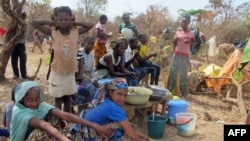The number of refugees fleeing the strife-torn Central African Republic for Cameroon has declined somewhat, but not because the C.A.R. is returning to calm. Refugees and aid workers say fewer people are able to make the trip because of malnourishment and insecurity.
The refugees entering in Gado from the troubled Central African Republic look tired, sick and hungry.
Refugee crossing declining
According to the U.N. refugee agency, the numbers crossing the border has dropped in recent weeks, from 10,000 per week to about 8,000 now.
Marie Anjaba, who fled her residence in the C.A.R. town of Bouar a month ago, says their numbers are falling because many Central Africans have died.
She said fewer people are coming now because many of them either die while trekking to Cameroon or are killed by Muslim Seleka rebels.
Among the humanitarian agencies taking care of the refugees is Doctors Without Borders, known by its French initials MSF. One of its medical staff, Gervail Martial Mbonye, said many of the refugees tell terrifying stories.
He said some of them told him they spent two months in the bush and all of their family members were killed.
Refugees flee for various reasons
MSF's communications officer for Cameroon, Laetitia Martin, said most of the refugees who are still coming are in critical need of medical attention. "The situation is quite worrying. Even though the number of people coming from Central Africa has decreased a bit, their health status and their mental status is very worrying. What is more specific today is that they are people who arrive maybe after one, two, three or four months in the bush in the C.A.R., hiding from the different groups that are attacking people," stated Martin.
Not all refugees tell stories of desperation. Joseph Akadji said he left the C.A.R. because he has children and after months of violence, the schools have not reopened.
He said he has decided to settle in Cameroon because their future will be compromised if they do not go to school even though violence has gone down in their country.
Akagbe Emmanuel said he and other students are looking for ways to fund their education.
He said they have projects like opening up poultry farms to raise money and fund their education and adds that some of them are in desperate need of money.
For now, the United Nations Children's Fund is providing them some food. Doctors Without Borders' Martin said they also provide health care for the refugees but that the needs of refugee children keep increasing.
"We have been doing 56,000 consultations, we are taking care of malnourished and it's like more than 92 percent of the refugee children that are being taken care of in MSF structures," said Martin.
The reduction in the number of refugees started after a deal signed last month between rival militias aimed at ending more than a year of religious conflict. The first Muslim prime minister in the Christian-dominated country, Mahamat Kamoun, was appointed in the wake of meetings.
However, the appointment has been rejected by the mainly Muslim rebel group Seleka.
An estimated 20 percent of C.A.R. inhabitants have fled their homes in the conflict which began as Seleka rebels toppled the president in March 2013.




